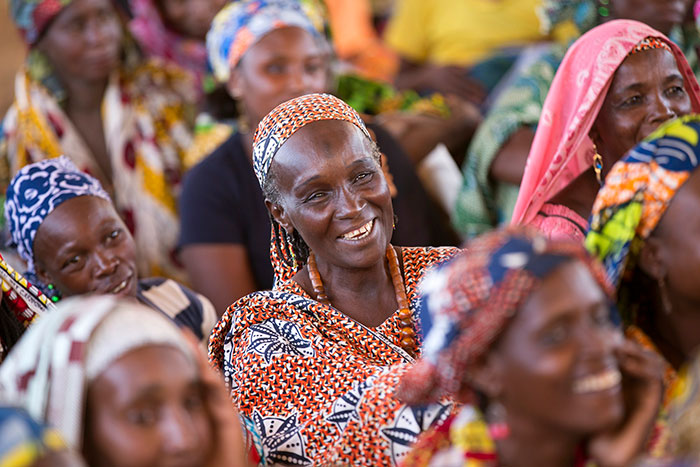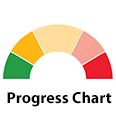Peace, justice and strong institutions

Women attend a community meeting at the UN Women centre in Ngam refugee camp, Cameroon. The programme supports vulnerable women and survivors of gender-based violence across seven camps in three regions.
© UN Women/Ryan BrownThe global homicide rate is declining, but reductions are insufficient to meet the 2030 target
The global intentional homicide rate declined from 5.9 per 100,000 people in 2015 to 5.2 in 2023. If current trends continue, the rate will decrease by 25 per cent between 2015 and 2030 – falling short of the 50 per cent SDG target. In 2023, homicides were heavily concentrated in Latin America and the Caribbean and in sub-Saharan Africa, which together accounted for nearly two thirds of all victims worldwide. Men made up 80 per cent of homicide victims, largely due to organized crime and gang violence. Women, however, faced a disproportionate risk within the home, with 60 per cent of female victims killed by partners or family members. In 2023 alone, about 51,000 women were killed by intimate partners or family members. Progress in reducing violence against women continues to lag, with the female homicide rate declining by just 5 per cent compared to the 14 per cent reduction for men.
Intentional homicide rate, 2023 (deaths per 100,000 population)

Loss of lives amid armed conflicts surged 40 per cent in 2024; casualties among children and women quadrupled in just two years
In 2024, at least one life was lost every 12 minutes due to armed conflict, totalling 48,384 conflict-related deaths, mostly civilians. This represents a 40 per cent increase from 2023 and marks the third consecutive annual rise. About four times more children (337 per cent) and women (258 per cent) were killed in 2023-2024 than in the previous biennium. Of these, 8 in 10 child deaths and 7 in 10 female deaths occurred in Gaza. Explosive weapons were the primary cause of lethal violence in several regions, while unexploded ordnance continued to threaten lives in Central and Southern Asia. Nearly 30 per cent of victims' status remain undetermined. These distressing figures reveal a stark deviation from the trajectory towards global peace, security and sustainable development. Immediate and concerted efforts are imperative to reverse this trend and to adhere to international humanitarian and human rights law.
Documented conflict-related deaths of children and women, 2015–2024 (number of deaths), with the percentage change from the previous biennium above the data bars

Strengthening institutions for inclusive governance shows progress, but deep gaps remain for trust, transparency and service delivery
Building effective, accountable and transparent institutions requires reliable fiscal management, accessible information systems and responsive governance structures that foster public trust and civic engagement. While significant progress has been achieved in the following areas, critical challenges persist:
- Reliable budgets are key to fiscal discipline, effective resource use and accountable institutions. As countries recover from the pandemic, global budget deviations improved from 12.6 per cent in 2020 to 9.6 per cent in 2023. However, low- and lower-middle-income countries still experienced higher volatility. From 2015 to 2023, budget deviations in low-income countries exceeded 15 per cent three times, peaking at 22.4 per cent in 2020. Upper-middle- and high-income countries showed greater stability.
- Access to information empowers citizens to hold governments accountable. By 2024, 140 countries had adopted access-to-information laws, up from just 14 in 1990. A 2024 survey found that 95 per cent of 125 countries have legal guarantees, but enforcement remains uneven. Countries with dedicated oversight bodies scored 7.5 out of 9 on compliance, compared to 3.7 for countries without them. Yet only 35 per cent of these bodies can mediate disputes, limiting opportunities to resolve conflicts efficiently and avoid burdensome legal processes.
- By 2024, 89 countries had fully compliant independent national human rights institutions (status A) – up from 70 in 2015 – serving 55 per cent of the global population. An additional 25 countries had institutions partially compliant with the Paris Principles (status B).
- Public service delivery shapes the population’s trust in government, with satisfaction levels revealing critical gaps across sectors and regions. Globally, administrative services receive the highest satisfaction rating at 64 per cent, followed by education at 58 per cent and healthcare at 57 per cent; however, healthcare shows the widest variation across countries (9–93 per cent).
- Trust in governance remains fragile, with many feeling politically unheard. Data from 83 countries show only 44 per cent of people believe their political systems are responsive and their voices matter in decision-making outcomes. Counter-intuitively, wealthier countries show lower political efficacy. Women report lower political voice than men. Restoring responsive and inclusive governance is critical to revitalizing civic trust and engagement.
Detected trafficking victims rise sharply, with children increasingly targeted
Globally, detected human trafficking victims increased by 25 per cent in 2022 compared to pre-pandemic levels and by 43 per cent compared to 2020. A key driver of this surge is the growing number of child victims, which has risen by 31 per cent since 2019. Children accounted for 38 per cent of all detected trafficking victims globally in 2022 – up sharply from 13 per cent in 2004. Girls are primarily trafficked for sexual exploitation (60 per cent), while boys are mainly exploited for forced labour (45 per cent) and other purposes such as forced criminality and begging (47 per cent). Regionally, Europe and Northern America detect more adult victims, whereas Central America, the Caribbean, sub-Saharan Africa, and Northern Africa record the highest shares of child victims, with children accounting for around 60 per cent of those detected.
Share of detected victims of trafficking in persons, by age group and sex, 2004–2022 (percentage)

Human rights defenders and journalists face alarming levels of violence in 2024
Killings and disappearances of human rights defenders, journalists and trade unionists remained alarmingly high in 2024, with at least 502 killings documented across 44 countries and 123 disappearances documented across 37 countries. While these represent slight declines from 2023, persistent human rights abuses continue to undermine progress towards peace, justice and accountability. Conflict remains a key driver: Northern Africa and Western Asia saw a 24 per cent rise in killings, while sub-Saharan Africa recorded a 32 per cent increase in disappearances.
Journalist killings increased 11 per cent to 82 deaths, with over 60 per cent in conflict zones – the highest share in over a decade. Northern Africa and Western Asia continues to be the most fatal region for journalists, while Latin America and the Caribbean remains the deadliest region for human rights defenders. Detentions of defenders also surged, with at least 31 countries recording at least 10 new cases in 2024, especially concentrated in Central and Southern Asia and in Northern Africa and Western Asia.
One in three prisoners are held without proper sentencing as the global inmate count grows
Access to justice is a fundamental human right, yet progress in reducing unsentenced detention has stalled. In 2023, 3.7 million people – 31 per cent of the global prison population of 11.7 million – were held in pretrial detention, a slight increase from 29 per cent in 2015. While some regions have improved, others have seen setbacks. In Latin America and the Caribbean, the share of unsentenced detainees fell from 41 to 30 per cent between 2015 and 2023. In contrast, Oceania saw an increase from 27 to 37 per cent, and in Central and Southern Asia, the share rose from 50 to 60 per cent.
Of those in pretrial detention in 2023, 94 per cent were men and 6 per cent were women. Globally, the unsentenced detention rate was 32 per cent for men and 30 per cent for women. However, regional differences persist. In sub-Saharan Africa, 50 per cent of incarcerated women versus 41 per cent of men were held without a proper sentence. Addressing these disparities is critical for upholding justice and human rights.

